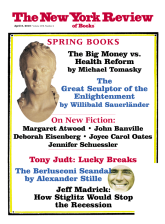In response to:
On Isaiah Berlin: Explorer from the February 25, 2010 issue
To the Editors:
Nicholas Kristof [“On Isaiah Berlin: Explorer,” NYR, February 25] rightly praises the last paragraph of Isaiah Berlin’s “Two Concepts of Liberty” (which you print as two). But an ambiguity in Berlin’s wording leads Kristof to misconstrue its last sentence. Since this is one of the most important sentences Berlin wrote, it is worth straightening out the misunderstanding.
Here is the passage in question:
“To realize the relative validity of one’s convictions,” said an admirable writer of our time [Joseph Schumpeter], “and yet stand for them unflinchingly is what distinguishes a civilized man from a barbarian.” To demand more than this is perhaps a deep and incurable metaphysical need; but to allow it to determine one’s practice is a symptom of an equally deep, and more dangerous, moral and political immaturity.
The trouble is caused by that “it” in the last sentence. Kristof not unnaturally takes it to refer to “this” earlier in the sentence, which in turn refers to Schumpeter’s celebrated criterion of civilization. On this interpretation, Berlin is warning against the paralysis that can be induced by excessive tolerance. As Kristof puts it, one must not let “appreciation of nuance emasculate one’s capacity to make strong moral judgments.” This would be essentially a restatement of Schumpeter’s point, and as such a somewhat anticlimactic ending to Berlin’s peroration, for all that he would have agreed with it.
Consultation of Berlin’s early drafts for this lecture shows that “it” in fact refers to “a deep and incurable metaphysical need.” Since this is unclear, I have changed “it” to “such a need” in later impressions of the piece. This reading gives a much stronger ending, since Berlin is now warning against being guided by what, immediately before the quoted passage, he calls “the certainties of childhood or the absolute values of our primitive past.” He is referring, that is, to the moral and political immaturity of monists, totalitarians, extremists, fanatics, fundamentalists—uncivilized barbarians who have not grown up, and who wreak havoc in the world. These are the worst villains of our age, not the relativists, even though the latter give succor to the former.
Henry Hardy
Wolfson College, Oxford University
Oxford, England
This Issue
April 8, 2010



